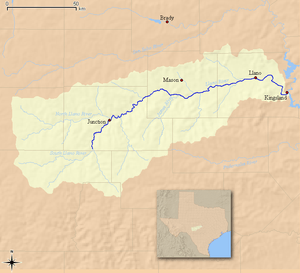Llano River
| Llano River | |
| Texas | |
 Sandstone bluffs along the Llano River, Mason County | |
| Country | |
|---|---|
| State | |
| Region | Edwards Plateau |
| Source | Confluence of North and South Llano |
| - location | Junction, Edwards Plateau |
| - elevation | 827 m (2,713 ft) |
| - coordinates | 30°29′33″N 099°45′22″W / 30.49250°N 99.75611°W |
| Mouth | Colorado River |
| - location | Kingsland, Texas Hill Country |
| - elevation | 252 m (827 ft) |
| - coordinates | 30°39′19″N 98°25′46″W / 30.65528°N 98.42944°WCoordinates: 30°39′19″N 98°25′46″W / 30.65528°N 98.42944°W |
| Length | 169 km (105 mi) |
 Map of the Llano River and associated watershed | |
| Website: Handbook of Texas: Llano River | |
The Llano River (/ˈlænoʊ/ LAN-oh) is a tributary of the Colorado River, approximately 105 miles (169 km) long, in central Texas in the United States.[1] It drains part of the Edwards Plateau in Texas Hill Country northwest of Austin.
Two spring-fed tributaries, the North and South Llano, stretch across the otherwise arid lands of West Texas before merging just east of the small town of Junction, Texas in Kimble County, forming the head of the Llano River proper.[1] The Llano River runs generally east-northeast through the rolling limestone terrain of the Edwards Plateau as it flows through Kimble County and across rural Mason County, passing to the south of the town of Mason, Texas. Continuing in an easterly direction, the river carves its way through the Llano Uplift, a roughly circular geologic dome of Precambrian rock, primarily granite, located in Central Texas.[2] Flowing through Llano County, the river passes to the north of Enchanted Rock and flows through the town of Llano, Texas. Northeast of Llano, it turns sharply to the southeast, joining the Colorado from the northwest as an arm of Lake Lyndon B. Johnson, about 15 miles (24 km) southeast of Llano and 50 miles (80 km) northwest of Austin, Texas.
This river is one of the few popular fly fishing destinations in the state of Texas, and contains Guadalupe bass, the state fish of Texas. The Llano also contains largemouth bass, alligator gar, and various sunfish.[3]
See also
References
- 1 2 Llano River from the Handbook of Texas Online
- ↑ Wilkes, R. "The Llano Uplift". Rob's Granite Page. Retrieved 2010-04-27.
- ↑ http://www.expedition-outfitters.net/id6.html